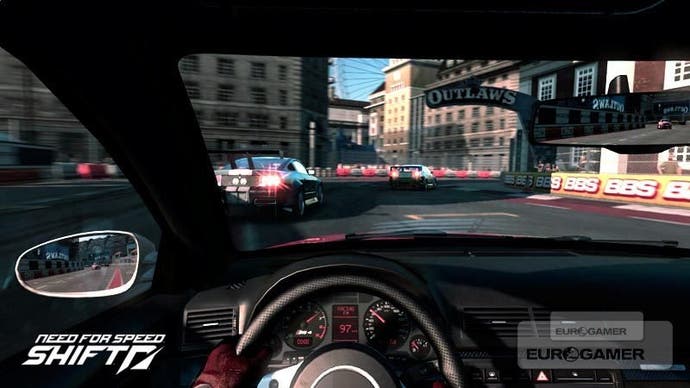Need for Speed: SHIFT
Short shift.
You can argue that driving racing cars should be scary, and there's something to that. Slightly Mad certainly seems to think so, underlining the point with ferocious camera-shake and extreme blurring and depth-of-field effects, making impacts jarring and high speeds nerve-wracking. With judicious tweaking of the control sensitivity, AI difficulty and driving aids to suit your skill level and style (none of which penalises rewards in any way), SHIFT's handling can be mastered. But you'll do so with grim satisfaction rather than pleasure. It's telling that even the normal setting for handling difficulty feels the need to offer heavy-handed assistance with braking and steering.
It just doesn't have the accessibility of GRID, the panache of PGR, or the heft and cast-iron credibility of true simulators like Forza, GT or SimBin's games. Wherever on the arcade/simulator spectrum it finds itself, a motor racing game should be about a love affair between tyre and tarmac, be it a quick fling or a deep commitment. SHIFT's version of the relationship is raw and passionate alright, but at times it verges on domestic abuse.
That's in stark contrast to the game away from the track, which is falling over itself to offer positive reinforcement. Few racing games have ever exhibited such a mania for showering the player in points, levels, trinkets, achievements and box-ticking unlockables.
Racing earns you money to buy and upgrade cars with (the Xbox 360 version tested also allows you to buy cars with Microsoft Points). You get profile points for certain on-track moves, which level you up. Driving levels reward you with cosmetic unlocks, special events and more money. Stars - earned for podium places, hitting profile point thresholds, and completing bonus objectives - unlock the content, which is split into four tiers of events plus the climactic Need for Speed World Tour. And then there are minor and master badges, a rather anal and pointless achievement system within an achievement system, which mostly seem to be doled out for pure grind: trade paint with X number of opponents, drive Y miles in a European car. The Achievements themselves are equally uninspired.

The incessant fanfare of congratulation and swelling progress bars after every race is all very friendly, and obsessive completists will lose their marbles over it, but it's a bit overweening. You wonder if this tangled set of interdependent advancement systems couldn't have been streamlined a bit.
Profile points are the most unusual, and the headline gimmick for Need for Speed: SHIFT. They're earned for either aggression (drafting, sliding, contact with opponents) or precision (following the racing line, "mastering" corners, clean overtaking moves). These will then characterise you as either aggressive or precise for the rest of the world to see in your increasingly elaborate level logo. Aggressive ratings are initially hard to avoid, but as the game comes to you, you will find your style naturally reflected in your rating. But since you'll pick up points in both all the time, and both contribute to your overall level, it doesn't feel like a choice, and has little direction or purpose.

It's certainly not as successful in lending a sense of personal investment to the track action as GRID's team system, or its finely-crafted story arc of the road to racing greatness. One positive SHIFT does share with its inspiration, though, is lively, characterful and unpredictable opponents to race against. A far cry from Gran Turismo's processional obstacles, these drivers make mistakes, get in scrapes, hustle each other and even have identifiable styles. This seriously increases the entertainment value of the racing, and makes up for the number of times you'll have to restart after a first-corner pile-up.








